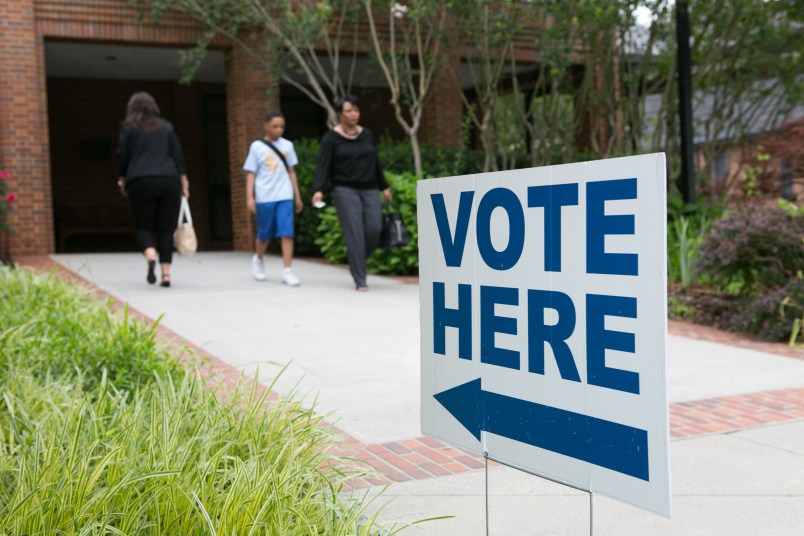This post has been updated to include Gwinnett County’s response.
State and local election officials in Georgia face a lawsuit over the rate at which one county has been rejecting mail-in ballots ahead of next month’s election.
The complaint — filed by the group Coalition for Good Governance, on behalf of individual voters and candidates in the state — takes issue with the relatively high rejection rates of absentee ballots in Gwinnett County, which is outside of Atlanta.
It comes on the heels of a Atlanta Journal-Constitution report Monday finding that the county had rejected 8.5 percent of the absentee ballots its received so far, compared with a statewide rejection rate of under 2 percent.
The lawsuit zeroed in on the 128 ballots — out of 391 ballots rejected — Gwinnett County tossed out because they were missing the voter’s date of birth, or the current date had been filled in instead.
Gwinnett County Board of Registration and Elections is named as a defendant, as is the state board of elections and Secretary of State Brian Kemp, the GOP gubernatorial who also has been sued for the state’s “exact match” law for voter registration.
Candice Brice, a spokesperson for the secretary of state, said in a statement that under Georgia law, the policies for processing mail-in ballots were up local officials’ discretion and that state officials are “not involved in those decisions.”
“Today, our office opened an investigation on behalf of the State Election Board to ensure that counties are following the law in making these determinations,” she said. “We will not be bullied by out-of-state organizations or political operatives who want to generate headlines and advance a baseless narrative. We will do our part to keep elections secure, accessible, and fair in Georgia.”
Gwinnett County spokesperson Joe Sorenson said in a statement that the election officials were complying with the law and that the county was “committed to a process that protects the voting rights of all of its citizens.”
His statement also noted that only two of the five plaintiffs in the lawsuit were county residents.
“Neither of the county residents has yet applied for absentee ballots. Notably, none of the allegations assert any violations of the law by the Gwinnett County Board of Registration and Elections or the County,” he said.
The complaint is seeking a court order that election officials stop rejecting absentee ballots on the basis of birth date issues, that they adopt new protocols for notifying affected voters that their absentee ballots have been rejected, and that they allow those voters to turn in their corrected absentee ballots in person to their voting precinct on election day.
The group Lawyer’s Committee for Civil Rights also sent the county a letter highlighting the absentee ballot rejection issues. According to the letter, the mail-in ballots rejected in Gwinnett County make up 40 percent of all absentee ballots rejected in Georgia. Nearly 15 percent of all mail-in ballots submitted by Asian voters in the county were rejected, according to the letter, as were 8 percent of the absentee ballots sent by black voters. Only 2.5 percent of absentee ballots sent in by white voters were rejected, the letter said.
Update: This story has been updated to include comment from Secretary of State Brian Kemp’s office.
Read the Coalition for Good Governance’s lawsuit below:







Sounds like a very prokempt operation…
Shouldn’t that be “Sounds like a very prokempt pogrom for non-whites”, figuratively of course.
Stephen Day — the Democratic-appointed chair of of the Gwinnett Elections Board, who is named as a defendant in the lawsuit — told the Atlanta Journal-Constitution earlier this week that the rejection rates were “unsettling,” but he denied that they were “rooted in some nefarious scheme” by local officials to ” to suppress any type of voter from voting.”
I believe that this is not a nefarious scheme. I think voter suppression is a natural organic manifestation of years of anti-black discrimination. When the SCOTUS wiped out significant parts of the Voting Rights Act, they allowed the reinstatement of everything the Voting Rights Act was designed to stop. And their chief reason was that the Act had worked! In other words, it’s working, so now we don’t need it anymore.
I could go on and on, but instead I will recommend a podcast - the latest from Chris Hayes on his podcast Why Is This Happening? It looks at the history of voter suppression.
“We will not be bullied by out-of-state organizations or political operatives who want to generate headlines and advance a baseless narrative."
Just an observation to share:
These words coming out of the Kemp camp are quite Trumpish. The Kemp campaign went full on Trump during the R primary run-off, but then turned to a more conciliatory posture right after that victory.
However, have been noticeably more Trumpish in the past few weeks, kinda like this quote. Suggesting to me that they are feeling the heat from Stacey Abrams.
I don’t know where Chief Justice Roberts got the idea that the USA is past racial shenagans when it comes to elections (Fox ‘news’ and right wing ideology probably.)
But it might be a good side project for TPM to assemble information to the contrary and send Roberts a recent history of how race based voter suppression and other voting obstacles are still happening, and have crawled out of the swamp since Roberts gutted the Voting Richard Act. and sending him regular updates to relieve him of his misunderstanding of the facts